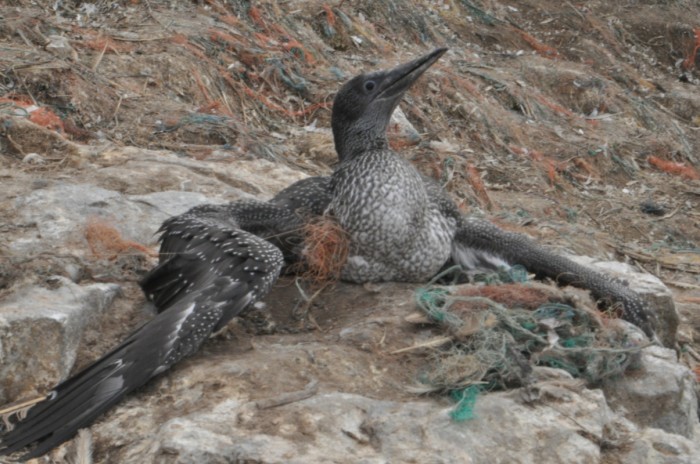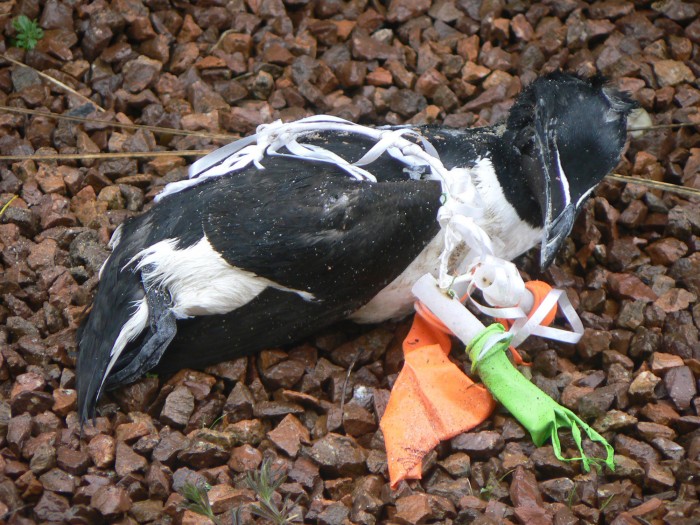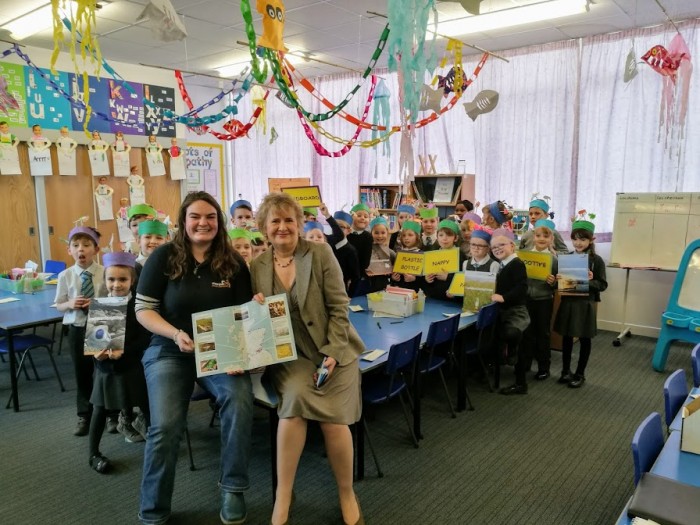×
Last month Small City, Big Personality popped along to the Salutation Hotel in Perth to attend a talk on plastic pollution by Catherine Gemmell of the Marine Conservation Society. To be honest, we were expecting it to be a modestly attended affair, perhaps held in more than one of the smaller suites upstairs. Instead, it was held in the main ballroom and it was packed to the rafters.
The talk was being hosted by the Royal Geographical Society, who had obviously done an amazing job of getting the word out to their members. However, beyond that, there also seems to be a real enthusiasm at the moment for tackling the problem of plastic pollution, leading to a cross-generational audience ranging from tiny tots to great-grannies eager to hear how they can help.
 And it's clear from Catherine's slideshow that our oceans do need our help. Wildlife is being affected by plastic pollution in numerous ways, from becoming entangled in plastics, to ingesting them. It is estimated that 177 marine species have consumed litter items which include whole plastic bags, gallon drums and balloons. Catherine shows us a photo slide of a gull pellet which you would normally expect to contain small bones, perhaps remnants of shells, but instead, this one contains balloons, cotton buds and pre-production plastic pellets called nurdles.
And it's clear from Catherine's slideshow that our oceans do need our help. Wildlife is being affected by plastic pollution in numerous ways, from becoming entangled in plastics, to ingesting them. It is estimated that 177 marine species have consumed litter items which include whole plastic bags, gallon drums and balloons. Catherine shows us a photo slide of a gull pellet which you would normally expect to contain small bones, perhaps remnants of shells, but instead, this one contains balloons, cotton buds and pre-production plastic pellets called nurdles.
It's clear from Catherine's slideshow that our oceans do need our help.
However, Catherine and the MCS choose to light a candle rather than curse the darkness. They've had a number of fantastic successes recently and seem keen not to squander the momentum they have built up. For example, the MCS was one of the main impetuses behind the introduction of a 5p charge for single-use carrier bags. Also, they're making major inroads into their quest for an outright ban on plastic cotton buds, having already convinced cosmetics giant Johnson & Johnson to use paper instead of plastic stems, causing most reputable brands to follow suit. In addition, the Beachwatch Beach Clean Events have been a tremendous success and are back in 2019. There are events all over the Uk and you can find one close to you here.
The next target in Catherine and The MCS's sights are wet wipes. Wet wipes, to  the surprise of many, are not flushable, even when the packet says so. They are made of polyester, the same stuff as a football jersey or a fleece. Now you wouldn’t flush your football jersey, would you? Well maybe if you're not a St. Johnstone fan but even then, you are probably better taking it to the recycling centre! Dr Laura Foster, Head of Pollution at MCS, said: “This source of microplastic is easy to prevent and we want any product which is being designed to be washed or flushed down the drain, to be free from plastics.”
the surprise of many, are not flushable, even when the packet says so. They are made of polyester, the same stuff as a football jersey or a fleece. Now you wouldn’t flush your football jersey, would you? Well maybe if you're not a St. Johnstone fan but even then, you are probably better taking it to the recycling centre! Dr Laura Foster, Head of Pollution at MCS, said: “This source of microplastic is easy to prevent and we want any product which is being designed to be washed or flushed down the drain, to be free from plastics.”
Another main focus of the MCS is the introduction (or in Scotland, re-introduction) of a deposit-return system for aluminium cans, plastic and glass Our Lady’s Primary have been inspirational for this campaign. Their passion for a clean environment gives us real hope for the future.bottles. Any behavioural economist will tell you the best way to encourage good behaviour is to incentivise it, so this seems like a no-brainer. The Scottish Government has already committed, with First Minister Nicola Sturgeon announcing in September 2017 that Scotland would implement a deposit return system. Scotland is now working hard on the design of a system.
They have the support of Perth in this matter as 8 pupils from Our Lady’s Primary, were invited to the Scottish Parliament to talk to decision-makers about the Wild Bottle Sighting initiative. This is an MCS campaign that maps littered plastic bottles to highlight the need for a UK-wide Deposit Return System.
Jenni Hume from 'Have You Got The Bottle?' commended the #wildbottlesighting project in raising awareness around Deposit Return Systems and said:
“The young people from Our Lady’s Primary have been inspirational for this campaign. Their passion for a clean environment gives us real hope for the future, and it was great to see a queue of MSP's wanting to meet them and talk about the campaign”.
 We also spoke to a spokesperson at Zero Waste Scotland who are currently working with the Scottish government on the Deposit Return System and are also supporting Project Beacon, a world-first Advanced Plastics Reprocessing facility at Binn Eco Park in Perthshire.
We also spoke to a spokesperson at Zero Waste Scotland who are currently working with the Scottish government on the Deposit Return System and are also supporting Project Beacon, a world-first Advanced Plastics Reprocessing facility at Binn Eco Park in Perthshire.
Project Beacon has the potential to be able to recycle all types of plastics – meaning Perthshire in the future could play a huge part in removing disposable plastics from the economy. This has the potential to reduce the amount of single-use plastic waste from entering the marine environment and even recycling it when it does.
We can help out ourselves by undertaking the 'No Plastic Challenge' this July. Despite its name, it's not about stopping using plastic entirely, but rather the use of single-use plastics. Small City, Big Personality are planning on giving this a go so we thought we would get some advice from Catherine who has been doing the challenge since 2015.
Perth's very first zero waste shop is opening soon, allowing eco-conscious shoppers to grab food and household products, free of wasteful packaging.
January 13th Monday 2020
Stagecoach are leading the way in the transition to a cleaner public transport future, which will provide a host of benefits to local communities.
January 6th Monday 2020
Conservationist and tv presenter Chris Packham gave a talk about photographer at Perth Concert Hall.
December 23rd Monday 2019